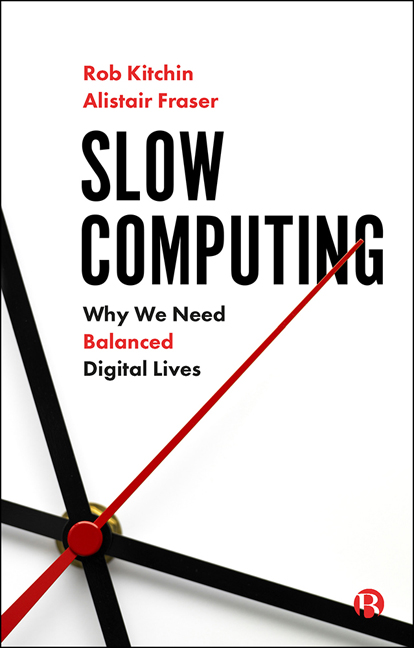Book contents
- Frontmatter
- Dedication
- Contents
- About the authors
- Acknowledgements
- 1 Living Digital Lives
- 2 Accelerating Life
- 3 Monitoring Life
- 4 Personal Strategies of Slow Computing
- 5 Slow Computing Collectively
- 6 An Ethics of Digital Care
- 7 Towards a More Balanced Digital Society
- Coda: Slow Computing During a Pandemic
- Notes
- Index
Coda: Slow Computing During a Pandemic
Published online by Cambridge University Press: 12 March 2021
- Frontmatter
- Dedication
- Contents
- About the authors
- Acknowledgements
- 1 Living Digital Lives
- 2 Accelerating Life
- 3 Monitoring Life
- 4 Personal Strategies of Slow Computing
- 5 Slow Computing Collectively
- 6 An Ethics of Digital Care
- 7 Towards a More Balanced Digital Society
- Coda: Slow Computing During a Pandemic
- Notes
- Index
Summary
The coronavirus pandemic started to sweep across the globe just as this book was going to press. All aspects of daily life changed once delay, and then containment measures, were put in place. Initially, closing down most workplaces and schools and restricting movement seemingly created new scope for people to practise slow computing. Rather than dashing here and there, trying to cope with a crowded diary and too many tasks, those people not on the frontline would be static and confined to the home. Life would become stationary, routines broken, busyness reduced, and work-life balance restored. However, the scope for pursuing slow computing is now in question like never before.
In many ways our lives have become even more digitallymediated. In our own cases, at very short notice we had to pivot our teaching from face-to-face contact on our university campus into virtual classes. New knowledge and skills had to be acquired about new pedagogies and platforms (Teams, Skype, Zoom, Moodle, etc). Classes and meetings were to be conducted from home. Social interactions with family and friends shifted to video calls, WhatsApp and Facebook. Information was elicited through social media and news sites. Streaming services replaced out-of-home social activities. Our time was still fragmented and interleaved, and rather than our sense of stress being lowered, it was heightened by the sense of isolation and the fear and anxiety expressed through our media channels. We thus tried to follow our own slow computing advice by limiting the use of social media and making sure to do non-digitally mediated activities: exercise, cooking, gardening, reading, playing traditional games.
We’re fortunate. For some of our colleagues (and also our students), the new digital realities of working at home have posed acute challenges. Many were left looking after bored, coopedup children who needed home schooling, play and reassurance. They’ve had to cope with family-wide fights over who will use the computer. New skills have been acquired to access and install software and work out how to use new services. Some have quite limited access to broadband internet. Other workers have not been allowed to self-isolate due to the nature of their job, performing essential work. In many cases, this work has intensified due to increased demand or the stress of trying to deliver it in difficult circumstances.
- Type
- Chapter
- Information
- Slow ComputingWhy We Need Balanced Digital Lives, pp. 170 - 175Publisher: Bristol University PressPrint publication year: 2020



